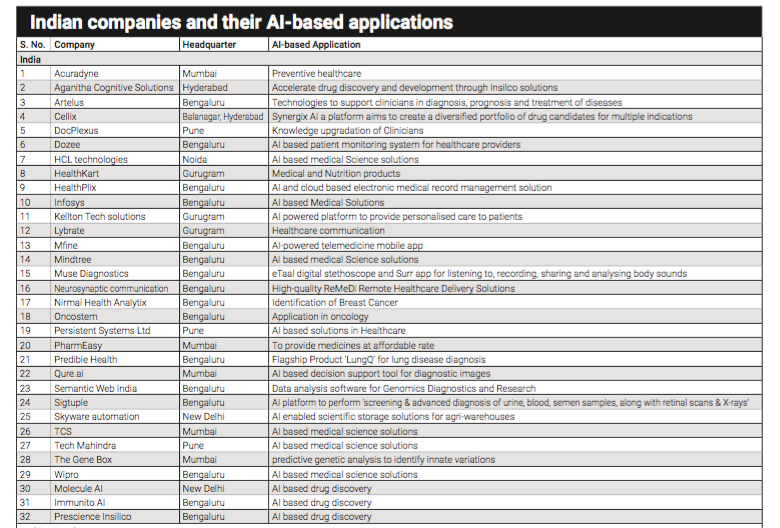How Biotech Sector Can Capitalise on AI
February 01, 2024 | Thursday | Views | By Dr Rajneesh K Gaur, Scientist F, Department of Biotechnology, Ministry of Science and Technology, Government of India
Artificial Intelligence (AI) is now ramified in every sector including biotechnology. The impact of AI is already visible in the biotech sector and there is a boom of startups using AI for various applications. However, there is a need to develop a holistic regulatory system to make the technology more responsible. Let’s explore further.
India has over 1900 AI startups including biotechnology (Zinnov-NASSCOM India Tech Start-up Landscape Report 2022). The pharma industry will be a major beneficiary of AI’s applications and might spend around $3 billion on AI in drug discovery by 2025.
In the biotech sector, AI has a big role to play in the analysis, learning, prediction and better decision-making of innovative solutions in areas of agriculture. It includes crop harvesting, monitoring crop and soil, gene editing, forecasting plausible yield), health (such as medical data analysis for finding novel drug targets, forecasting drug efficacy and toxicity, speed up the drug development process, creating personalised medicine, medication management, detecting abnormalities like cancerous tumours, to build new wearable devices that can detect and monitor certain disorders), to modify the genes and traits of animals and create mixed or cross-breed versions, to provide efficient production and better product quality, to identify the locations of genes, classification of protein along with protein’s catalytic role and biological function, analysis of gene expression and predictive modelling.
In the last few years, several AI-enabled biotech startups have come up. The application of AI has resulted in the development of a few notable algorithms such as new AI models e.g. ‘ProtGPT2’ and ‘ProGen’. ProtGPT2 and ProGen have been trained on 45 million and 280 million protein sequences respectively. These model software have been used to design new proteins. Application of machine learning resulted in enhancing the accuracy of structure prediction from 70 to >80 per cent.
By forecasting the 3D protein structure, AI helps in determining the effect of a substance on the target as well as safety considerations before its synthesis or production e.g. AlphaFold (2023), a Google subsidiary DeepMind algorithm, significantly improved the modelling of 3D protein systems from amino acid sequences. The other biotech startups in the last few years added to the growth of generative AI, including ‘Jasper’ and ‘Stability AI’, which has its text-to-image generation tool called ‘Stable Diffusion (2022)’. Open-source AI programmes such as ‘CRISPR libraries’ and ‘H2O.ai’ are convenient for executing repetitive tasks like data entries and analysis.


AI applications are now slowly culminating in product development and their commercialisation. In the USA, the FDA recently approved a few Software as a Medical Device (SaMD) e.g. IDx-DR (2018) for screening of diabetic retinopathy and ‘DiA Imaging Analysis's AI program’ (2023) to assist clinicians in performing cardiac ultrasound exams. In 2021, Abbott launched its new artificial intelligence-powered coronary imaging system in Europe. AI is also changing the field of Radiology and Radiotherapy processes and helps in making ‘Nanorobots’ as novel drug delivery systems to enhance drug efficacy and reduce adverse effects. In India, the development of AI-based products, especially, Medical aids is supported by the Biotechnology Industry Research Assistance Council (BIRAC).
Regulatory framework
AI provides easier, cheaper, and faster production capabilities with the danger of misusing the technology. In the biotech sector, it may lead to solutions which might compromise social security and the life of human beings such as the design and development of new bioweapons or toxins which are hard to detect. Under these circumstances, AI needs tougher measures to control its misadventure. All the major governments in the world are formulating a regulatory framework to control the AI field. The USA has multiple Acts for regulating the AI’s activities. The various Acts are ‘National Artificial Intelligence (AI) Initiative Act (2020)’, Algorithmic Justice and Online Transparency Act, Artificial Intelligence (AI) Training Act, AI in Government Act and recently Artificial Intelligence Research, Innovation and Accountability Act (AIRIA), 2023. In line with these acts, the US Food and Drug Administration (FDA) issued the “Artificial Intelligence/Machine Learning (AI/ML)-based Software as a Medical Device (SaMD) Action Plan''.
The EU proposed the Artificial Intelligence Act (AIA), which contemplates regulation of AI based on its potential risks, and the General Data Protection Regulation (GDPR), Digital Services Act, Digital Markets Act to protect users privacy and to curb the anticompetitive practices of the tech giants. Australia’s ‘Artificial Intelligence (AI) Ethics Framework’ examines the probability of risk, together with the consequence via suggestive frameworks. Countries like Singapore, China, UAE and Brazil have issued ‘National AI Strategies’. In China, no company can produce AI services without proper approvals.
India does not have specific laws for data protection but personal information is safeguarded under section 43A and Section 72A of the ‘Information Technology Act’, 2000. The provisions of the IT Act, combined with the Information Technology (Reasonable Security Practices and Procedures and Sensitive Personal Data or Information) Rules, 2011 (SPDI Rules) establish a technology-agnostic regime for protecting sensitive personal information for all corporate bodies. Recently, the Ministry of Electronics and Information Technology (MeitY), India proposed the ‘Digital India Act (DIA)’ and stated that the proposed law would regulate "high-risk AI systems" through legal, quality testing framework to examine regulatory models, algorithmic accountability, zero-day threat and vulnerability assessment, examining AI based ad-targeting, content moderation, etc. The Act will be implemented alongside the ‘Digital Personal Data Protection Act (2023)’.
Indian Initiatives
The Government of India is also well aware of the potential implications of AI in the country's industrial landscape and has taken several initiatives to enable the AI ecosystem. In 2018, NITI Aayog published its discussion paper titled ‘National Strategy for Artificial Intelligence’ for identifying some of the sectors like Healthcare, Education, Agriculture, Smart Cities and Mobility for deployment of AI. The Indian Government launched the National Artificial Intelligence Portal called https://indiaai.gov.in/ in May 2020. The portal is a one-stop digital platform for AI-related developments in India, sharing resources such as articles, startups, investment funds in AI, resources, companies and educational institutions related to AI in India. The Data Empowerment and Protection Architecture (DEPA) by NITI Aayog presents a technical framework for people to retain control of their personal data and the means to leverage it to avail services and benefits.


In 2021, the Department of Science and Technology (DST), New Delhi through the Indo-US Science and Technology Forum (IUSSTF) launched a joint collaborative US-India Artificial Intelligence (USIAI) initiative. Under this initiative, Research and Technology Development in AI is being promoted and implemented in the country through a network of 25 technology innovation hubs set up under the National Mission on Interdisciplinary Cyber-Physical Systems (NM-ICPS). The Ministry of Electronics and Information Technology (MeitY), India has also operationalised a clutch of Centers of Excellence (CoEs) to assist in knowledge management and creating capabilities to capture new and emerging areas of technology.
BIRAC, either alone or in association with MeitY and the National Association of Software and Services Companies (NASSCOM), supports Indian industries in the AI area. Further MietY and NASSCOM jointly initiated a programme ‘Futureskills PRIME’ – a certification programme for reskilling/upskilling IT professionals in 10 emerging areas including Cloud computing and Artificial Intelligence for making India a Digital Talent Nation.
The Department of Biotechnology also implemented a programme on Artificial intelligence under the Niti-Aayog’s ‘Responsible AI #AIforAll’ guidelines to ensure the safe and responsible use of AI (R-AI).
The department is also in the process of initiating a Programme on ‘Bio-manufacturing’. This initiative will have an in-built component on establishing Bio-artificial Intelligence (Bio-AI) Hubs. These hubs will support AI-powered platforms for the microbial engineering of small molecules at an industrial scale. The initiative will bring together scientific and technological advancement towards achieving a major goal of the Department’s vision of BioE3 (i.e. Biotechnology for Economy, Environment and Employment) for green, clean and prosperous India.
Conclusion
Biotechnology has immense scope and applications of AI in streamlining the bio-manufacturing processing, data generation and analysis, executing detailed repetitive tasks, decision making, etc. Industries have already embraced and started delivering AI-based products. To capitalise on AI, a nurturing ecosystem, with the support of open and responsible inter-state regulatory systems is demanded.
Dr Rajneesh K Gaur, Scientist F, Department of Biotechnology, Ministry of Science and Technology, Government of India
(The opinions and thoughts expressed reflect only the author's views, not the organisation)













